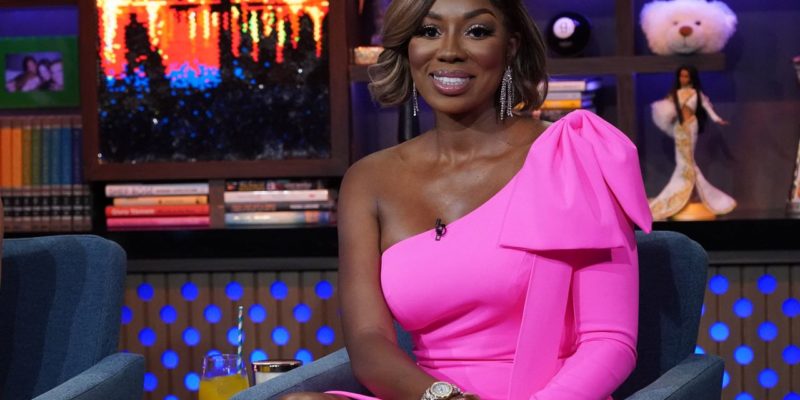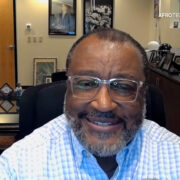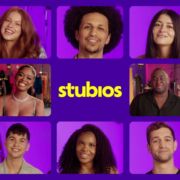I Run This is a weekly interview series that highlights Black women and femmes who do dope shit in entertainment and culture while creating visibility, access and empowerment for those who look like them. Read my Audie Cornish interview here.
Wendy Osefo’s name has been on a lot of tongues over the past few weeks. That’s mainly because the multihyphenate businesswoman has been at the center of a truly nasty conflict on “Real Housewives of Potomac.”
Nearly halfway through this season, castmate Mia Thornton organizes a trip to Miami for the crew. While the ladies are at dinner, Thornton confronts Osefo about “beef” with her friend, former Real Househusband Peter Thomas, over a business dealing. Osefo and Thornton begin to argue. In the midst of an exchange of hurtful words, Thornton throws a drink at Osefo. When Osefo mentions a rumor about Thornton’s marriage, things get uglier, and Thornton responds by hurling her purse at Osefo.
As this is happening, a clear line is drawn between those who support Osefo and those who support Thornton. The fallout results in Osefo being largely ostracized by the group during their trip (and in a post-episode disclaimer that Johns Hopkins University, where Osefo is a professor, has “no involvement” with the show.)
However, viewers quickly called out castmates Gizelle Bryant and Robyn Dixon for siding with Thornton, and Dixon individually for recording only Osefo during the altercation and calling her antagonistic. Folks on social media pointed to a double standard in the way Bryant and Dixon condoned Thornton’s acts of violence yet were vehemently against Monique Samuels fighting Candiace Dillard Bassett in Season 5.
The altercation between Thornton and Osefo happened in May while the cast was still filming the current season. In the latest episode, Osefo apologizes to Thornton for the part she played in the altercation days after the incident. Thornton apologized on Twitter on Nov. 23, stating that she “must do what’s best for brand [and] partners.”
Osefo said she was retriggered when the episode aired but is surprised and overwhelmed by the amount of support she’s gotten. In the midst of talking about the incident on the show, she’s been busy promoting her memoir “Tears Of My Mother,” releasing a lotion to accompany her Onyi Home Essentials candle line and continuing to teach at Johns Hopkins.
“I’m going to rise above this,” Osefo said.
As y’all have probably peeped so far, this week’s “I Run This” is a bit different. Osefo takes some time out to share what it’s been like “reliving” the conflict these past few weeks and discusses her many professions and her refusal to let the world put her in a box.
Charles Sykes/Bravo/NBCU Photo Bank via Getty Images
We have a lot to discuss, from the season thus far, to your book, to your career overall. But I first want to ask, how are you?
I’m OK. All things considered, I’m good.
The truth of the matter is, you guys are seeing all of this now, but this was filmed months ago. Just to put a time stamp on it. When we’re in Miami, we’re celebrating Karen’s birthday in May. So I’ve had months to sort of process, but I would be lying if I said that watching it again doesn’t trigger different emotions, because it absolutely does. But I’m OK, and I’m thankful for the love and the support, and I see it, and I appreciate it, and it’s lifting me.
What have the past two weeks been like for you?
It has been difficult. Oftentimes, you guys see me, and I sort of present this stoic presence of just not letting things faze me. My husband said recently, “You are the definition of ‘Check on your strong friend.’” Because while I put up that face, when I’m by myself, it does hurt. It does break me.
And in that moment, if I could be quite candid, I started questioning myself, because when you hear all these voices and everyone is telling you that you did something, you start thinking, wait, did I … was it me? And so there was a time when I was just taken aback and saying “Wait, what just happened?” Because it all happened so fast.
But now that I watch it back, I realize I’m not crazy. That is the sequence of events. That is how it happened, and these things weren’t warranted. And I think that to add assault on it is then to hear the conversations that you weren’t privy [to]. We are all watching it as a family, literally me and the viewers, because I don’t know everything that happened, or who walked away from the table, or who said what, or who did what. And I think that that actually makes it hurt more … when you hear the additional conversations that occurred.
I would say, in that moment, I felt more so like it was an agenda, a clear one. And despite what they were seeing, they were going to stick to whatever agenda that was, and that agenda was to make Wendy the bad guy.
In many conversations that I’m seeing online and in group chats, people are really praising you for not retaliating with violence. In the moment, what are you telling yourself about how you respond to a drink and a purse being thrown at you?
I’m a woman of faith, and the reason I say that is it takes more restraint and thinking not to react than it does to react. Meaning the knee-jerk reaction, the humanistic reaction is if somebody throws a drink at you, you’re probably going to throw something back or do something. And in that moment, I didn’t. And in that moment, me not doing that, I can only say, but God. The human response is to do something back. And if it’s not just when the drink is thrown at you, then when it’s doubled down and the purse is used to hit you, then you’re like, “OK, well, come on now. All bets are off. You did them once and now we’re doing it twice.”
And so a part of me was thinking in my head, really fast, and I was thinking a mile a minute about if this, then what would happen? What is this? And in that episode, I glanced over and I look at Robyn, and when I see the look on her face and the look on Gizelle’s face, I immediately realize, “That’s what they want you to do.” And that was it for me. Because in that moment, when I knew that, again, there seemed to be some sort of agenda, there seemed to be, “Let’s see how far we can push her, let’s see how she reacts to this, let’s see what she will do,” that’s when I was like, “I’m going to be a pawn in whatever you’re trying to do, whether that’s to get me off the show, whatever it is you’re trying to do. No, no, no. I’m going to rise above this.”
“I started crying because when things happen to you, you don’t think anyone cares. You think, oh, we’re all watching this show. But just that outpouring of love, support, words of affirmation, people telling you, ‘You are enough.’”
Where do you think that agenda comes from and what do you think fuels it?
I can’t speak for them. I have no idea. But what I will say this season that I think is very clear is that you start to understand if you’re for them, they appreciate you. If you’re not, they’ll do anything to get you off or to try to harm you.
In the most recent episode, you heard Robyn explicitly state, “Of course I’m not going to defend Wendy. I don’t like her.” You see. You showed your hand. You showed your hand because now you’re saying that whatever your judgment is is clouded based upon if you like somebody or not, not what’s right or wrong.
And that encapsulates everything that we need to know about the dynamics within this group. It’s not whether something’s right or wrong. It’s who are the parties in certain situations, and based on who those parties are will depend on how we react to them.
What role do you think colorism plays in how they respond to you specifically?
I think that is such a nuanced thing that we don’t have the time to do it justice. And I will leave it at that.
How supported do you feel right now?
From the audience? From my family? Child, they got my mama activated. I don’t think I’ve shared this with anyone. I was really looking at my messages the other day because I finally got a chance to just come up for air. And I started crying. I started crying because when things happen to you, you don’t think anyone cares. You don’t think anyone cares. You think, oh, we’re all watching this show. But just that outpouring of love, support, words of affirmation, people telling you, “You are enough.”
I think sometimes people see you and they may think, “Oh, she don’t need that. She’s on TV.” But when you see what feels like an entire community just wrap their arms around you and say, “We stand with you. We love you. We got you.” I mean, I was there boohooing like a baby. I had people sharing stories with me about, “This reminds me of when I was at an all-girls school and they did X, Y, and Z.” I mean, people are coming out with personal testimonies about just how they could relate to the story, just telling you, “This too shall pass, and we see you.” Let me tell you something. The greatest thing you could tell to somebody is, “I see you.”
I don’t mean to make this more than what it is or harp on it, but when I say, “I love y’all,” I mean that. I will never forget this moment because … I thought, based on how this has played, [audiences] were going to try to justify [Thornton’s] actions. So to wake up and to see people like, “No. We march at dawn.” To wake up and see people like that over little me, man, I can’t even… My heart is so full and I’m just so thankful.
Do you feel supported specifically by the network?
Yeah. They didn’t tell her to throw the drink. That’s not their directive. They’re here following a group of women in a friendship circle and seeing all dynamics. And so in that way, I feel like there’s nothing necessarily that they should have done or could have done. But let’s see the aftermath. Let’s see what happens.
What do you want the outcome to be from this? Do you want an apology? What does closing this chapter look like for Wendy?
It’s going to take some time. [On the most recent episode], I apologized for my actions. If I had any role in this, I take accountability. In that moment, Mia did not. And that’s all I need to know. When it was fresh, when we were all at the table, when we have all had days to sort of breathe, she who physically assaulted me did not take any accountability and did not apologize.
So for me, I have moved forward. I have been able to say, if someone shows you who they are, believe them. And so anything that comes after that moment, I don’t need it, nor do I want it, because even her most recent “statement,” that’s because of the public backlash. You’re apologizing because now the public is frying you, not because you really feel that way. So as far as what I want to come from it, I’m OK. I have taken accountability for anything I said. And she has to now deal with whatever she has to deal with. But I’m good. I’m moved on.
I want to talk about your book, too, “Tears Of My Mother.” What fueled you to write this book and what is the message that you want to send about your journey as it relates to being a first-generation Nigerian American? What do you want people to take away from who you are and the legacy that your mother has left and that you are leaving because of that?
The biggest thing that fueled me to write this book is I became a mother myself. And once you become a mother, you start asking yourself questions about how you’re going to raise your children and what from your own childhood made an impact, either positive or negative. I was raised by a single mother who came to this country with nothing. I’ve seen her work her way up. I’ve seen her struggle. And so her struggles have basically been a footprint for which myself and my sister have tried to make her proud.
And so as people are reading the book, what I want them to take away from this is that no matter where you come from or who you come from, you, too, can achieve your own dreams. The story of maybe being the one in your family who “made it,” and how that puts undue pressure on you, and how people expect so much of you, and I just think the story of generational trauma, and how we may not know that we’re carrying it, but there comes a time in everyone’s life that we have to step back and take pause and say, “Just because this happened to me in my life and my childhood and it hurt me this way does not give me the right to now inflict that on the next generation.”
So I think the book is multilayered, but I do think it’s just relatable to not only better understand me but to also start conversations that I think are really important in the Black community about mothers and their daughters. Because quite frankly, what our moms expect from their daughters is not the same level that our moms expect from their sons. So with that being said, it begs the question of how, oftentimes, Black mothers raise their daughters and love their sons. And when you do that, you have to understand that there’s going to be some scars left. And so how do we now start to address those scars?
One thing that no one can say about you is that you’re not a boss, because you literally have so many jobs. You’re a professor at Johns Hopkins, a political analyst, an author, a reality star. Do you face any conflict with any of your roles, especially because you are so front-facing?
Ooh, great question. And the honest [answer] is yes. They conflict with each other because our society has made it such that you can only be one thing. And when people are multihyphenates or they have multiple layers, people start to say, “Oh, that person must be confused.” We don’t celebrate duality. We question it. If I was, let’s say, an exotic dancer at night and a doctor in the morning, people will say, “That doesn’t make any sense.” Why doesn’t it make any sense? Because society has trained us to think like that.
“I just want to be Wendy, but society’s not ready for Wendy. They’re not ready for women who can do multiple things and be in an academic setting and quote something from Lil Baby.”
I remember the season I came out with my candles, everybody was like, “I thought you were a professor.” Yes, I am, and I can make candles. I can do two things at one time. I could walk and chew gum at the same time. And I think society has to come to grips with the fact that people, especially women, can wear multiple hats at the same time.
You never ask, can a man have it all? It’s only when it comes to a woman. And what that is telling us, when we say things like that, is that that’s a rarity. It’s not a rarity. We can do multiple things. And I was just talking to my colleague at my university yesterday, and I was saying how W.E.B. Du Bois talks about in his book, this notion of double consciousness, but he talks about it in the sense of being Black in white spaces and how we sort of have to pivot. And I think for me, I have a sense of double or even triple or quadruple consciousness because when I’m in certain spaces, I have to pivot because there’s certain things that they expect from me and certain things they don’t expect from me.
So when I’m in academia, I have to orate or command myself in a different way because that’s the space I’m in. And it sucks. I hate it. I just want to be Wendy, but society’s not ready for Wendy. They’re not ready for women who can do multiple things and be in an academic setting and quote something from Lil Baby. They’re not ready for that. They’re not ready for me to say, yes, I’m a boss, I love Michelle Obama but I also love Jayda Wayda because I think she’s a businesswoman. They’re not ready for that. And I think that’s not a Wendy issue, that’s a society issue.
How are you taking care of your mental health, especially being a public figure? What does that look like?
I’m working on it. I don’t want to lie to y’all and say, “Oh, I do this, I do that.” I don’t. I’m working on it. Social media is definitely limited, and I started to work out, eat healthy and just have times where it’s just Wendy time. And I think that’s really important, just to center yourself mentally and to make sure that you’re OK because you can’t pour from an empty cup.
I’m wondering what the status of the restaurant that you hope to open is. Is that still on the table? Has that been put on pause?
Y’all got to stay tuned and see what’s what.
And I’ll just say this: There are many people who I can go into restaurateur-ship with. It doesn’t just have to be a man from Miami.
What is the goal specifically with that? What do you hope to achieve, whether it be representation-wise or to elevate your own? What do you want for Wendy in this franchise?
I say it in my book. I talk about how growing up, I never saw women who looked like me on TV. And I just think that it’s just such a magical opportunity to be able to represent something that you never saw growing up. And that alone is something that I’m proud of and I hope to continue to do myself, and my highly melanated, chocolate family on TV. And I just hope that shows people that we do exist, and women like me do exist.
Beyond the show and all of the hats that you wear as yourself, as Wendy, how do you want to be remembered?
I want to be remembered as someone who came on this platform and was able not just to show a different type of Black woman, but to also show that they’re unapologetic about themselves. And that oftentimes, people try to make it seem like I’m a rarity. I’m not. There’s lots of Black women like me. They just don’t have a platform. And so I think that there’s power in our show. There’s power in what the network shows you guys, and I just want to be remembered as a woman who was authentically her, regardless of what anyone said.











Comments